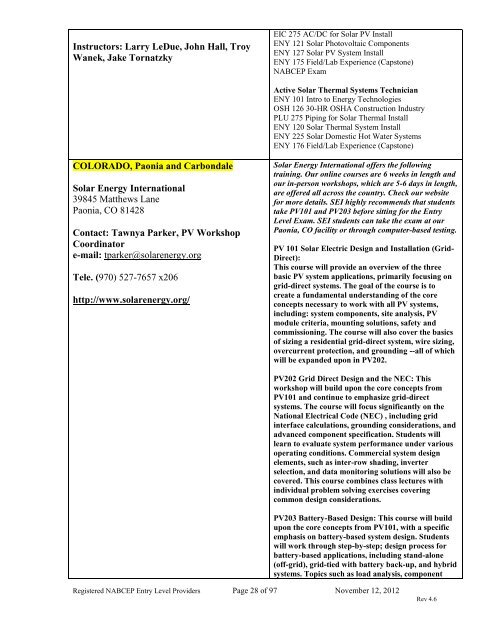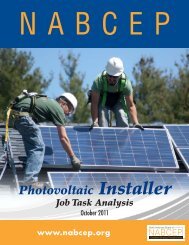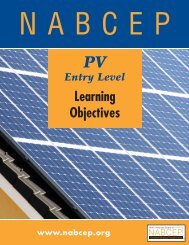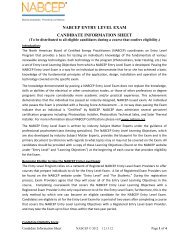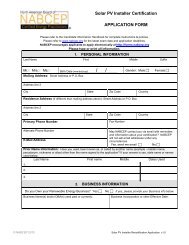approved providers for nabcep® pv entry level certificate of ...
approved providers for nabcep® pv entry level certificate of ...
approved providers for nabcep® pv entry level certificate of ...
You also want an ePaper? Increase the reach of your titles
YUMPU automatically turns print PDFs into web optimized ePapers that Google loves.
Instructors: Larry LeDue, John Hall, Troy<br />
Wanek, Jake Tornatzky<br />
EIC 275 AC/DC <strong>for</strong> Solar PV Install<br />
ENY 121 Solar Photovoltaic Components<br />
ENY 127 Solar PV System Install<br />
ENY 175 Field/Lab Experience (Capstone)<br />
NABCEP Exam<br />
Active Solar Thermal Systems Technician<br />
ENY 101 Intro to Energy Technologies<br />
OSH 126 30-HR OSHA Construction Industry<br />
PLU 275 Piping <strong>for</strong> Solar Thermal Install<br />
ENY 120 Solar Thermal System Install<br />
ENY 225 Solar Domestic Hot Water Systems<br />
ENY 176 Field/Lab Experience (Capstone)<br />
COLORADO, Paonia and Carbondale<br />
Solar Energy International<br />
39845 Matthews Lane<br />
Paonia, CO 81428<br />
Contact: Tawnya Parker, PV Workshop<br />
Coordinator<br />
e-mail: tparker@solarenergy.org<br />
Tele. (970) 527-7657 x206<br />
http://www.solarenergy.org/<br />
Solar Energy International <strong>of</strong>fers the following<br />
training. Our online courses are 6 weeks in length and<br />
our in-person workshops, which are 5-6 days in length,<br />
are <strong>of</strong>fered all across the country. Check our website<br />
<strong>for</strong> more details. SEI highly recommends that students<br />
take PV101 and PV203 be<strong>for</strong>e sitting <strong>for</strong> the Entry<br />
Level Exam. SEI students can take the exam at our<br />
Paonia, CO facility or through computer-based testing.<br />
PV 101 Solar Electric Design and Installation (Grid-<br />
Direct):<br />
This course will provide an overview <strong>of</strong> the three<br />
basic PV system applications, primarily focusing on<br />
grid-direct systems. The goal <strong>of</strong> the course is to<br />
create a fundamental understanding <strong>of</strong> the core<br />
concepts necessary to work with all PV systems,<br />
including: system components, site analysis, PV<br />
module criteria, mounting solutions, safety and<br />
commissioning. The course will also cover the basics<br />
<strong>of</strong> sizing a residential grid-direct system, wire sizing,<br />
overcurrent protection, and grounding --all <strong>of</strong> which<br />
will be expanded upon in PV202.<br />
PV202 Grid Direct Design and the NEC: This<br />
workshop will build upon the core concepts from<br />
PV101 and continue to emphasize grid-direct<br />
systems. The course will focus significantly on the<br />
National Electrical Code (NEC) , including grid<br />
interface calculations, grounding considerations, and<br />
advanced component specification. Students will<br />
learn to evaluate system per<strong>for</strong>mance under various<br />
operating conditions. Commercial system design<br />
elements, such as inter-row shading, inverter<br />
selection, and data monitoring solutions will also be<br />
covered. This course combines class lectures with<br />
individual problem solving exercises covering<br />
common design considerations.<br />
PV203 Battery-Based Design: This course will build<br />
upon the core concepts from PV101, with a specific<br />
emphasis on battery-based system design. Students<br />
will work through step-by-step; design process <strong>for</strong><br />
battery-based applications, including stand-alone<br />
(<strong>of</strong>f-grid), grid-tied with battery back-up, and hybrid<br />
systems. Topics such as load analysis, component<br />
Registered NABCEP Entry Level Providers Page 28 <strong>of</strong> 97 November 12, 2012<br />
Rev 4.6


